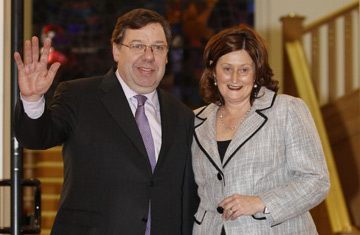
Irish Prime Minister Brian Cowen, with his wife Mary, waves to photographers after winning a vote of confidence from members of his party, Fianna Fail
When Irish Prime Minister Brian Cowen announced on Jan. 20 the date for a long-awaited election, it was a sign that he was finally facing the inevitable. The confidence vote he had survived on Tuesday wasn't a victory — just a temporary reprieve. Following months of scandal, public anger over tight austerity measures and government miscommunication, and the reluctant acceptance of a bailout, his party, Fianna Fail, is expected to suffer an electoral wipeout in the poll set for March 11.
But with Ireland preparing to vote Cowen out of power, it's clear that his disastrous economic legacy will remain. The Irish now face a different problem: finding a new leader who can bring the country once considered an economic miracle back from financial meltdown.
Tuesday's vote by Fianna Fail politicians was done by secret ballot, so nobody knows how close the results were. But fears among party members of a crushing defeat in the election have been growing. In the lead-up to the confidence vote, Cowen's Foreign Minister, Micheal Martin, challenged the Prime Minister at a press conference, saying Fianna Fail needed a change at the top before the election — and claiming that most of the party agreed. After Cowen survived the vote, Martin resigned. And yet, he told reporters he will "wholeheartedly" support the Prime Minister: "We go into this election as a united party behind our leader."
The result has bought Cowen some time to show Ireland that he and Fianna Fail are still the best choices for the job of pulling the country out of financial ruin. "We have been fighting for the country, for its very survival, for its sustainability against the greatest economic and financial crisis we have seen in over 80 years," he told national television station RTE after the confidence vote.
But the Irish will take some convincing. Fianna Fail has the lowest approval ratings in the party's 85-year history, while Cowen is suffering from historically low approval ratings of 14%. His decision in December to accept an €85 billion ($115 billion) E.U.-IMF bailout, as well as his former role as Finance Minister, has made him a prime target for the public's frustrations.
And it doesn't help that several prominent members of Cowen's party are no longer on his side. Finance Minister Brian Lenihan publicly attacked him shortly ahead of the vote on Tuesday, hitting out at the recent revelations that sparked the confidence vote: that Cowen had played golf in 2008 with the former chairman of toxic bank Anglo Irish just months before it received a state guarantee and later a state bailout of €34 billion ($45 billion). Cowen has denied that the golf game with the Anglo Irish boss influenced his decision to bail out the bank.
A last-ditch Cabinet reshuffle that Cowen had planned for Thursday in an attempt to give Fianna Fail a pre-election boost was blocked by government partners the Greens. Now Cowen goes to the vote weakened without key members of his Cabinet after six ministers resigned and he was forced to reassign six others to their positions.
Observers predict that Cowen could now cling to his Prime Minister's role until just after the election, at which point a new Fianna Fail leader — in the shape of Martin, Lenihan or Arts Minister Mary Hanafin — would replace him to rebuild from the ashes of the party.
In the meantime, the results of the election will most likely hand power over to a coalition of center-right party Fine Gael and center-left Labour. Fine Gael leader Enda Kenny is seen as the front runner to become the next Prime Minister. The former Tourism Minister faced his own leadership troubles last June, when he fought off an internal heave sparked by his low approval ratings and the rise of Labour in the polls. Since then Fine Gael has regained ground and is the most popular party, with 30% approval (Labour's at 25%).
But Kenny's popularity as a potential leader remains low (23%), possibly a reflection of his failure to connect with voters and his inability to articulate the electorate's frustration. Labour party leader Eamon Gilmore enjoys much stronger personal popularity, with a rating of 44%. But that may not translate into votes as the party does not have enough experienced candidates to field.
As the campaign begins, questions will undoubtedly be raised over how Fine Gael and Labour, with their vastly differing policies, will manage to govern together. But both parties are up for the challenge. Now Cowen starts the fight to keep the title everyone already thinks he's lost, and Ireland looks to an election that could dramatically alter the nation's political landscape.
